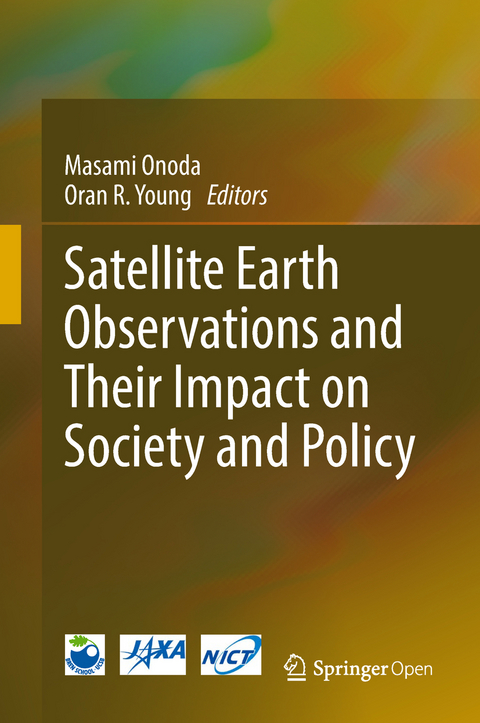
Satellite Earth Observations and Their Impact on Society and Policy
Springer Verlag, Singapore
978-981-10-3712-2 (ISBN)
This book is open access under a CC BY license.
Masami Onoda is currently the U.S. and multilateral relations interface at the International Relations and Research Department of the Japan Aerospace Exploration Agency, Fellow of the Institute of Global Environmental Strategies and Advisor to the space debris start-up Astroscale Pte Ltd. Dr. Onoda has been engaged in international coordination of satellite programs including serving on the Secretariat of the intergovernmental Group on Earth Observations in Geneva, Switzerland, and earlier as the Secretariat of the Committee on Earth Observation Satellites. She has also supported technology transfer to SMEs for a small satellite project. She holds a Ph.D. in Global Environmental Studies and a Master’s degree in environmental management from the Kyoto University Graduate School of Global Environmental Studies, and a bachelor’s degree in international relations from the University of Tokyo. Oran R. Young is a renowned Arctic expert and a world leader in the fields of international governance and environmental institutions. His scientific work encompasses both basic research focusing on collective choice and social institutions, and applied research dealing with issues pertaining to international environmental governance and the Arctic as an international region. Professor Young served for 6 years as vice-president of the International Arctic Science Committee and was the founding chair of the Committee on the Human Dimensions of Global Change within the National Academy of Sciences in the U.S. He currently chairs the Scientific Committee of the International Human Dimensions Programme on Global Environmental Change and the Steering Committee of the Arctic Governance Project.
Satellite Earth Observations in Environmental Problem-Solving.- Policy and Earth Observation Innovation Cycle (PEOIC) Project (Japan).- Innovation in Earth Observations as a National Strategic Investment: The Experience of the U.S.- Benefits Assessment of Applied Earth Science.- ESA’s Earth Observation Strategy and Copernicus.- Earth Observation--UK Perspective and Policy.- Benefit Assessment of the Application of Satellite Earth Observation for Society and Policy: Assessing the Socio-economic Impacts of the Development of Downstream, Space-based Earth Observation Applications.- Chinese Earth Observation Program and Policy.- Greenhouse Gas Observation from Space.- Japanese Satellite Earth Observation: Status and Policy Issues.- The New 10-Year GEOSS Strategy for 2016 and Beyond.- The Value of Global Earth Observations.- Earth Observation Support to the UN Framework Convention on Climate Change: The Example of REDD+.- Quantitative Assessment of the Earth Observation Data and Methods Used to Generate Reference Emission Levels for REDD+.- Evaluation of Space Programs: Select Findings from the OECD Space Forum.- Integrating Earth Observation Systems and International Environmental Regimes.- Conclusion.
| Erscheinungsdatum | 12.07.2017 |
|---|---|
| Zusatzinfo | 51 Illustrations, color; 6 Illustrations, black and white; XXV, 221 p. 57 illus., 51 illus. in color. |
| Verlagsort | Singapore |
| Sprache | englisch |
| Maße | 155 x 235 mm |
| Themenwelt | Naturwissenschaften ► Biologie ► Ökologie / Naturschutz |
| Naturwissenschaften ► Geowissenschaften ► Geografie / Kartografie | |
| Naturwissenschaften ► Geowissenschaften ► Meteorologie / Klimatologie | |
| Recht / Steuern ► EU / Internationales Recht | |
| Sozialwissenschaften ► Politik / Verwaltung ► Staat / Verwaltung | |
| Technik ► Umwelttechnik / Biotechnologie | |
| Schlagworte | Benefits assessment • Big data and analysis • Observation-based environmental policy • open access • Satellite Earth Observation • Science and policy |
| ISBN-10 | 981-10-3712-4 / 9811037124 |
| ISBN-13 | 978-981-10-3712-2 / 9789811037122 |
| Zustand | Neuware |
| Informationen gemäß Produktsicherheitsverordnung (GPSR) | |
| Haben Sie eine Frage zum Produkt? |
aus dem Bereich


